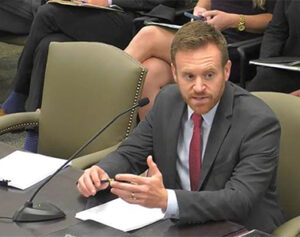By Alex Halper
 Do a quick Google search with the phrase “chamber of commerce advocacy” and you can probably find the responses: promoting lower taxes, against overregulation, and in favor of a competitive business climate. But leading the charge for criminal justice reform? While it appears in the search, it’s certainly not what would have popped into my consciousness years ago when I started working for the PA Chamber. Yet there I was, most recently in late August at a state House Judiciary Committee hearing on that very subject, sitting next to a brave Pennsylvanian telling her story of resilience – both of us offering different but complementary perspectives on why we supported legislation to help individuals with a criminal record get back into the workforce.
Do a quick Google search with the phrase “chamber of commerce advocacy” and you can probably find the responses: promoting lower taxes, against overregulation, and in favor of a competitive business climate. But leading the charge for criminal justice reform? While it appears in the search, it’s certainly not what would have popped into my consciousness years ago when I started working for the PA Chamber. Yet there I was, most recently in late August at a state House Judiciary Committee hearing on that very subject, sitting next to a brave Pennsylvanian telling her story of resilience – both of us offering different but complementary perspectives on why we supported legislation to help individuals with a criminal record get back into the workforce.
How did I, and the PA Chamber, become champions for criminal justice reform?
The story begins around 2015 when criminal justice reform advocates and some lawmakers started discussing the novel concept of automatically sealing old criminal records – providing a clean slate to those who had paid their debt to society and remained crime-free.
The PA Chamber entered the discussion with a traditional chamber of commerce approach: how are employers impacted? Could there be liability concerns for businesses? Existing law already limited the extent to which an employer could consider criminal history in the hiring process – but this new concept warranted careful review and scrutiny.
The process played out slowly, as it often does, with lawmakers from both parties in the House and Senate negotiating, and key stakeholders – including the District Attorneys Association – joining the discussion. The concept was developed, further refined to focus on low-level offenses after the job seeker had spent a substantial period of time staying crime-free. Additionally, we worked with employment attorneys and bill advocates to draft targeted liability protections for employers. This amendment was ultimately added to the legislation, and we agreed to be listed as a supporter of the bill that became Act 56 of 2018.
In the years since “Clean Slate” became a first-of-its-kind in the nation law, the feedback from the businesses community has been overwhelmingly positive. Employers, and the attorneys who often represent them, appreciate the liability protections added – even if they’ve not yet cited that provision in litigation, its inclusion represents an acknowledgment of employers’ legitimate concerns. Others claim the very act of sealing records inherently protects employers by potentially establishing plausible deniability.
Perhaps most importantly, we’ve experienced how criminal justice reform initiatives can and should be part of a broader strategy to address workforce challenges in Pennsylvania.
With respect to Clean Slate, advocates and direct beneficiaries of this policy report that it encourages individuals to reenter the workforce, look for employment, apply for and accept jobs. We believe them. This population represents a potentially vast pool of under-tapped talent in Pennsylvania and public policy should help facilitate their employment.
Criminal justice reform has now become a regular feature of our legislative and workforce policy agenda. We’ve supported occupational licensure reform to make the law more clear and fair for incarcerated individuals and reentrants seeking career opportunities. We’ve supported legislation to reform probation rules and have successfully advocated for the inclusion of employment-specific provisions, including encouraging job training programs and helping probationers maintain employment.
We’ve also supported expansions to Clean Slate in the years since its bipartisan enactment. The original law provides that summary offenses, certain non-violent misdemeanors and crimes committed as a juvenile, as well as arrests that did not result in conviction, will be automatically sealed after 10 years if the offender remains crime free. Act 83 of 2020 added criminal records of those pardoned or acquitted; and individuals who have paid all restitution, but are still paying court fees.
House Bill 1826 was introduced this session and would further expand Clean Slate to include certain low-level frug felonies – old criminal records like the one that still impacts Pennsylvanian Gina Davis, who dealt with addiction issues in her younger years and was convicted of a drug felony in 1994.
I had the opportunity to sit next to Ms. Davis at the Aug. 31st state House Judiciary Committee hearing. I spoke of employer workforce challenges. She told a powerful story of overcoming adversity but still facing hardship as a result of her nearly 30-year-old conviction – and the power of Clean Slate to provide the confidence people need to reenter the workforce. She and I came from very different perspectives, traversed different routes to that hearing, but arrived at the same place.
I learned a lot from Ms. Davis that day and others who’ve shared their story. Enough to know that “PA Chamber advocacy” and “criminal justice reform” are two phrases that should continue to be closely associated.
Alex Halper is director of government affairs for the PA Chamber.